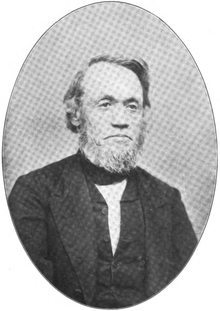Charles Sholes
Charles Clark Sholes (January 8, 1816 – October 5, 1867) was a Wisconsin politician and newspaperman. He was the 8th Speaker of the Wisconsin State Assembly and 2nd Mayor of Kenosha, Wisconsin. He also served in the Wisconsin State Senate.[1] His younger brother was Christopher Latham Sholes, the inventor of the typewriter.[2]
Charles C. Sholes | |
|---|---|
 | |
| 8th Speaker of the Wisconsin State Assembly | |
| In office January 10, 1855 – January 9, 1856 | |
| Preceded by | Frederick W. Horn |
| Succeeded by | William H. Hull |
| 3rd Mayor of Kenosha, Wisconsin | |
| In office April 1852 – April 1856 | |
| Preceded by | David C. Gaskill |
| Succeeded by | Volney Hughes |
| Member of the Wisconsin Senate from the 8th district | |
| In office January 10, 1866 – October 5, 1867 | |
| Preceded by | Anthony Van Wyck |
| Succeeded by | Anthony Van Wyck |
| Member of the Wisconsin State Assembly from the Kenosha 1st district | |
| In office January 10, 1855 – January 9, 1856 | |
| Preceded by | Samuel Hale, Jr. |
| Succeeded by | Henry Johnson |
| Representative to the Legislative Assembly of the Wisconsin Territory from Brown County | |
| In office November 6, 1837 – December 7, 1840 | |
| Personal details | |
| Born | Charles Clark Sholes January 8, 1816 Norwich, Connecticut |
| Died | October 5, 1867 (aged 51) Kenosha, Wisconsin |
| Resting place | Green Ridge Cemetery Kenosha, Wisconsin |
| Nationality | American |
| Political party | National Union (1866-1867) Republican (1850s) Liberty Party (1843-1848) Democratic (before 1843) |
| Spouse(s) | Sarah Elizabeth McKinney (died 1895) |
| Children | Frank (b. 1848; died 1850) Edward (b. 1849; died 1907) Winnie L. (b. 1851; died 1866) Charles (b. 1855; died 1856) Harry (b. 1856; died 1877) Madge (b. 1861; died 1877) William O. (b. 1862; died 1941) Mary Jane (Berger) (b. 1864; died 1899) Susy (b. 1867; died 1868) |
| Mother | Catherine (Cook) Sholes |
| Father | Orrin Sholes |
| Relatives | Christopher Latham Sholes (brother) |
| Occupation | politician |
Biography
Born in Norwich, Connecticut, to Orrin and Catherine Sholes, he worked for a time in Pennsylvania and learned printing. In 1836, he moved to Green Bay, in the Wisconsin Territory and published his own paper, the Green Bay Wisconsin Democrat. He was also a publisher of the first newspaper in Madison, the Wisconsin Enquirer. While in Green Bay, he first entered politics, serving as a Democrat in the lower chamber of the Wisconsin Territorial Assembly during the first and second sessions (1837-1840).
In 1840, he moved his plant and paper to Kenosha, then known as "Southport", and renamed the paper the Telegraph. In Kenosha, his brother Christopher Latham Sholes managed the paper, and eventually purchased the business from Charles.
In 1843, he foreclosed a lien on the Wisconsin Enquirer and moved that company to Milwaukee, where the paper was renamed the Milwaukee Democrat. That same year, however, Sholes stopped production of that paper and began publishing a new paper called the American Freeman, affiliated with the abolitionist Liberty Party. Sholes was managing editor of that paper until 1846.[3]
In 1847, Sholes returned to Kenosha and made his home there. He was elected Mayor of Kenosha, serving from 1852 to 1856. And was elected as a Republican to represent Kenosha in the Wisconsin State Assembly for 1855, he was also chosen as Speaker of the Assembly that year. Later that year, he was the Republican nominee for Lieutenant Governor of Wisconsin, but was defeated by Democrat Arthur MacArthur, Sr., who went on to briefly serve as Governor due to a controversy over election fraud in the gubernatorial election.
Along with Zalmon G. Simmons, he was the founder of the Wisconsin State Telegraph Company, and in 1855 he became president of that company.
Sholes returned to politics one more time in 1865, earning election to the Wisconsin State Senate on the National Union Party ticket for the 1866 and 1867 sessions.[4][5]
He died in 1867, after the legislative session was over, but before the official expiration of his term as Senator.
He was married to Sarah Elizabeth McKinney. Together they had nine children, though only three lived to adulthood.
Notes
- http://politicalgraveyard.com/bio/shober-shorett.html
- http://www.wisconsinhistory.org/dictionary/index.asp?action=view&term_id=1741&search_term=sholes
- http://www.wisconsinhistory.org/dictionary/index.asp?action=view&term_id=2625&search_term=sholes
- "Archived copy" (PDF). Archived from the original (PDF) on 2006-12-09. Retrieved 2012-07-13.CS1 maint: archived copy as title (link)
- "Sholes, Charles Clark 1816 - 1867". Wisconsin Historical Society. Retrieved May 12, 2019.
External links
| Political offices | ||
|---|---|---|
| Preceded by David C. Gaskill |
Mayor of Kenosha, Wisconsin 1852 – 1856 |
Succeeded by Volney Hughes |
| Preceded by Frederick W. Horn |
Speaker of the Wisconsin State Assembly 1855 – 1856 |
Succeeded by William H. Hull |